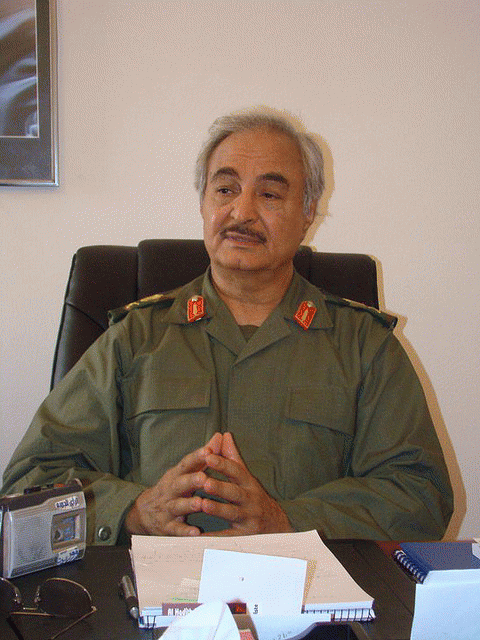Following the Libyan parliamentary elections on June 20, which saw violent clashes that and at least 70 deaths, it seems that Libya is once again flirting with the 'failed state' label. Since the 2011 Western-backed revolution, the country has continued to dwindle away, fraught by internal turmoil as the prospect of having a functioning democracy float further out of reach. One man though could not care less: General Khalifa Haftar.
General Haftar to save the day?
Khalifa Haftar has been a powerful force on the ground in Libya since the start of the revolution in 2011, when he led the rebels in their crusade to overthrow Qaddafi. Today, he is a vocal critic of Libya's current leaders and government, which he insists are weak and have failed to create strong institutions and ensure the security of the Libyan people. Furthermore, he calls for a full-blown war against the Islamists in the country who, he claims, are transforming the state of Libya into the ultimate jihadist terror club.
Armed with a considerable Messiah complex and supported by his rogue military squad, he launched 'Operation Dignity' to cleanse the country of the Muslim Brotherhood and other 'fundamentalists'. He has gathered the support of both army units and tribes, launched air strikes on military bases in Benghazi and made several attempts to oust the already crippled central government in Tripoli. Despite his halfhearted attempts at fighting 'terrorism', the self-proclaimed 'Libyan National Army' is more likely to drive Libya deeper into anarchy.
It is no secret that Haftar, once a general under Qaddafi before falling into disgrace over a botched incursion in Chad, has been trained by US intelligence officers in the delicate arts of guerrilla warfare and sabotage. Indeed, after the general fled Libya in the 1980s, he comfortably settled down in the state of Virginia, just outside Washington D.C., with the generous help of the American administration. Adopted by the CIA, he became the head of the Libyan National Army (LNA), the military wing of Libya's main opposition force, the National Front for the Salvation of Libya.
From this prestigious position, Haftar and other US-backed opposition rebels began to plan for their return to Libya. In 1996, the general turned US agent took part in an unsuccessful coup against Qaddafi. He then fell off the radar for the next 15 years, only to resurface in 2011 as a self-styled Lawrence of Arabia coming to the rescue of his oppressed countrymen caught under the spell of radical Islam.
The narrative should sound familiar to anyone who has ever looked at Africa's Cold War history. Haftar's path to power includes all the trademark elements of the CIA's traditional modus operandi: the lone warrior, returning from self-imposed exile to lead a military crusade against the tyrannical and illegitimate regime. The US, unsatisfied with the status quo and desperate to push its own agenda, has called on its long experience in intervening from the inside. For this, Libya has paid a heavy price, as today it stands with little infrastructure, fragile government and no real leader to bring the real revolution to the people.
Although Haftar appears to have gained the support of many frustrated Libyans, his statements about the country transforming into "the graveyard of global terrorism" imply that he is more likely to care about his zealous mission of destroying Islamists and to install his own rule rather than about fostering democratic transition and stability.
The US should be wary of who it privately supports within Libya because, while their interests in the form of fighting terrorism are currently served, this situation can quickly be reversed as ordinary Muslims begin to loath the people who claim to have 'freed them'.
The answer lies in the past
So what can be done for a state on the brink of a multi-way tug-of-war? While everyone agrees that the Libyan government needs stronger institutions along with a strong military and police force to protect itself and its citizens, this seems unlikely to be achieved in the current political turmoil. One consensus solution that has recently come to light through Libya's Foreign Minister is that of a constitutional monarchy. The idea is that a symbolic monarch would have the opportunity to unite the regions, tribes and frustrated rebels for long enough to prop up infrastructure and create a stable state with working institutions.
A large part of the problem today lies in the disproportionate distribution of oil revenues, Libya's main source of wealth, and the uneven development of the three regions of the country. These disparities have led to rebel retaliation, fragmentation and violence toward the barely functioning central authorities in Tripoli. Qaddafi was able to keep these forces at bay for a time and ensure a semblance of stability, but in a manner that fails to coincide with our democratic principles of government. A monarch, on one hand, standing as a figurehead, could unite these various factions, and a new constitution, on the other, would give powers to the legislature and help the country move forward, away from what currently looks to be erupting into another civil war.
Today, the Libyan people, like many others subject to the failures of the Arab Spring, find themselves trapped between an ineffective government unable to control the country and violent militias who continue to fuel instability and impede democracy. Rather than supporting anti-Islam ex-generals, the US and its allies should look to a system of reform for Libya and help create a consensus government, "for a people for whom so much has [already] gone so wrong".






